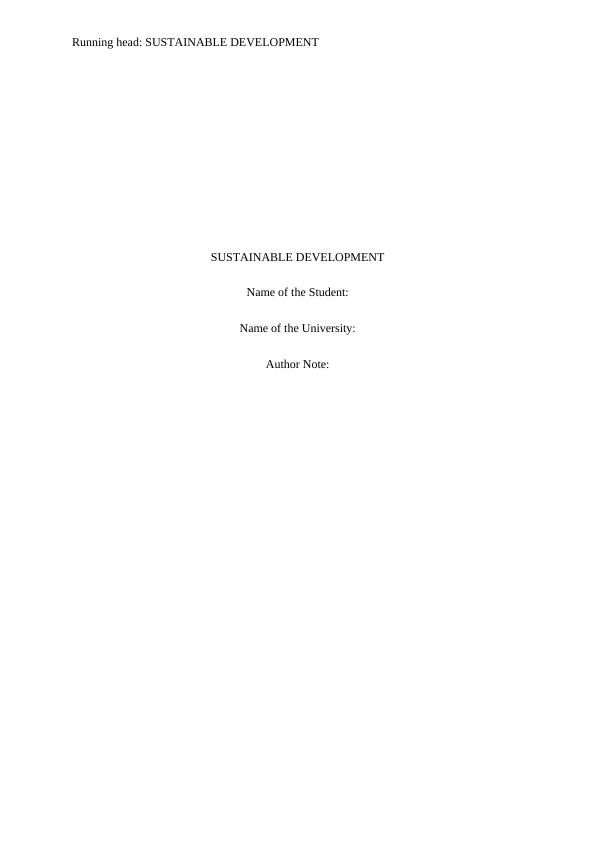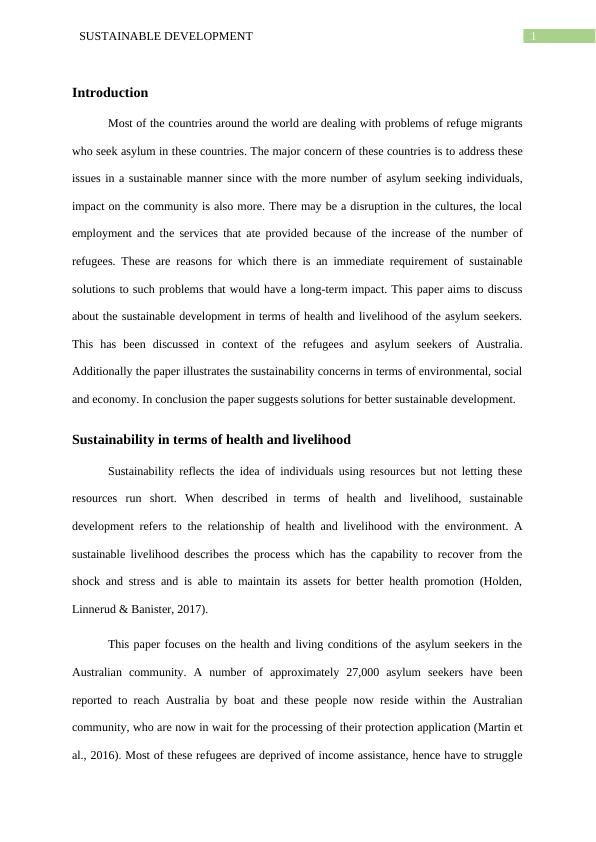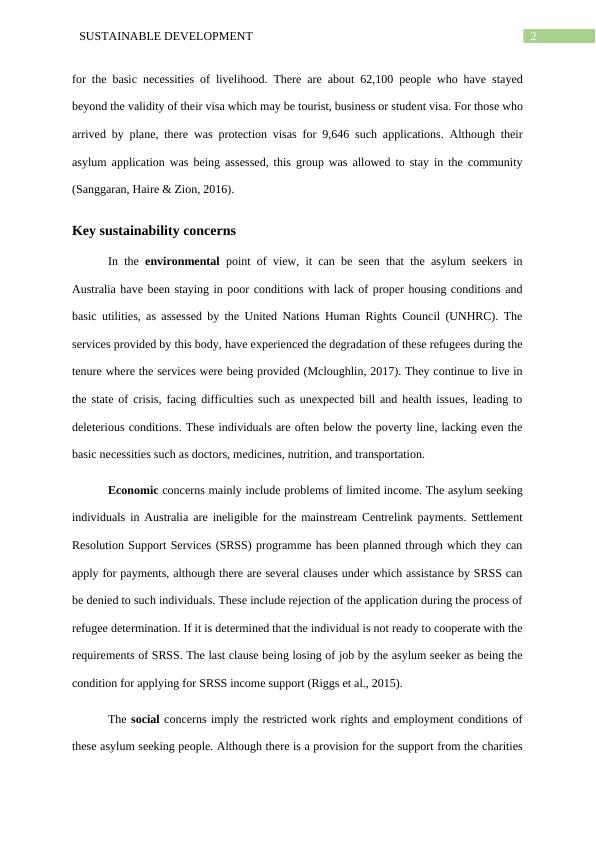Sustainable Development for Health and Livelihood of Asylum Seekers in Australia
Added on 2023-06-10
9 Pages2515 Words387 Views
Running head: SUSTAINABLE DEVELOPMENT
SUSTAINABLE DEVELOPMENT
Name of the Student:
Name of the University:
Author Note:
SUSTAINABLE DEVELOPMENT
Name of the Student:
Name of the University:
Author Note:

1SUSTAINABLE DEVELOPMENT
Introduction
Most of the countries around the world are dealing with problems of refuge migrants
who seek asylum in these countries. The major concern of these countries is to address these
issues in a sustainable manner since with the more number of asylum seeking individuals,
impact on the community is also more. There may be a disruption in the cultures, the local
employment and the services that ate provided because of the increase of the number of
refugees. These are reasons for which there is an immediate requirement of sustainable
solutions to such problems that would have a long-term impact. This paper aims to discuss
about the sustainable development in terms of health and livelihood of the asylum seekers.
This has been discussed in context of the refugees and asylum seekers of Australia.
Additionally the paper illustrates the sustainability concerns in terms of environmental, social
and economy. In conclusion the paper suggests solutions for better sustainable development.
Sustainability in terms of health and livelihood
Sustainability reflects the idea of individuals using resources but not letting these
resources run short. When described in terms of health and livelihood, sustainable
development refers to the relationship of health and livelihood with the environment. A
sustainable livelihood describes the process which has the capability to recover from the
shock and stress and is able to maintain its assets for better health promotion (Holden,
Linnerud & Banister, 2017).
This paper focuses on the health and living conditions of the asylum seekers in the
Australian community. A number of approximately 27,000 asylum seekers have been
reported to reach Australia by boat and these people now reside within the Australian
community, who are now in wait for the processing of their protection application (Martin et
al., 2016). Most of these refugees are deprived of income assistance, hence have to struggle
Introduction
Most of the countries around the world are dealing with problems of refuge migrants
who seek asylum in these countries. The major concern of these countries is to address these
issues in a sustainable manner since with the more number of asylum seeking individuals,
impact on the community is also more. There may be a disruption in the cultures, the local
employment and the services that ate provided because of the increase of the number of
refugees. These are reasons for which there is an immediate requirement of sustainable
solutions to such problems that would have a long-term impact. This paper aims to discuss
about the sustainable development in terms of health and livelihood of the asylum seekers.
This has been discussed in context of the refugees and asylum seekers of Australia.
Additionally the paper illustrates the sustainability concerns in terms of environmental, social
and economy. In conclusion the paper suggests solutions for better sustainable development.
Sustainability in terms of health and livelihood
Sustainability reflects the idea of individuals using resources but not letting these
resources run short. When described in terms of health and livelihood, sustainable
development refers to the relationship of health and livelihood with the environment. A
sustainable livelihood describes the process which has the capability to recover from the
shock and stress and is able to maintain its assets for better health promotion (Holden,
Linnerud & Banister, 2017).
This paper focuses on the health and living conditions of the asylum seekers in the
Australian community. A number of approximately 27,000 asylum seekers have been
reported to reach Australia by boat and these people now reside within the Australian
community, who are now in wait for the processing of their protection application (Martin et
al., 2016). Most of these refugees are deprived of income assistance, hence have to struggle

2SUSTAINABLE DEVELOPMENT
for the basic necessities of livelihood. There are about 62,100 people who have stayed
beyond the validity of their visa which may be tourist, business or student visa. For those who
arrived by plane, there was protection visas for 9,646 such applications. Although their
asylum application was being assessed, this group was allowed to stay in the community
(Sanggaran, Haire & Zion, 2016).
Key sustainability concerns
In the environmental point of view, it can be seen that the asylum seekers in
Australia have been staying in poor conditions with lack of proper housing conditions and
basic utilities, as assessed by the United Nations Human Rights Council (UNHRC). The
services provided by this body, have experienced the degradation of these refugees during the
tenure where the services were being provided (Mcloughlin, 2017). They continue to live in
the state of crisis, facing difficulties such as unexpected bill and health issues, leading to
deleterious conditions. These individuals are often below the poverty line, lacking even the
basic necessities such as doctors, medicines, nutrition, and transportation.
Economic concerns mainly include problems of limited income. The asylum seeking
individuals in Australia are ineligible for the mainstream Centrelink payments. Settlement
Resolution Support Services (SRSS) programme has been planned through which they can
apply for payments, although there are several clauses under which assistance by SRSS can
be denied to such individuals. These include rejection of the application during the process of
refugee determination. If it is determined that the individual is not ready to cooperate with the
requirements of SRSS. The last clause being losing of job by the asylum seeker as being the
condition for applying for SRSS income support (Riggs et al., 2015).
The social concerns imply the restricted work rights and employment conditions of
these asylum seeking people. Although there is a provision for the support from the charities
for the basic necessities of livelihood. There are about 62,100 people who have stayed
beyond the validity of their visa which may be tourist, business or student visa. For those who
arrived by plane, there was protection visas for 9,646 such applications. Although their
asylum application was being assessed, this group was allowed to stay in the community
(Sanggaran, Haire & Zion, 2016).
Key sustainability concerns
In the environmental point of view, it can be seen that the asylum seekers in
Australia have been staying in poor conditions with lack of proper housing conditions and
basic utilities, as assessed by the United Nations Human Rights Council (UNHRC). The
services provided by this body, have experienced the degradation of these refugees during the
tenure where the services were being provided (Mcloughlin, 2017). They continue to live in
the state of crisis, facing difficulties such as unexpected bill and health issues, leading to
deleterious conditions. These individuals are often below the poverty line, lacking even the
basic necessities such as doctors, medicines, nutrition, and transportation.
Economic concerns mainly include problems of limited income. The asylum seeking
individuals in Australia are ineligible for the mainstream Centrelink payments. Settlement
Resolution Support Services (SRSS) programme has been planned through which they can
apply for payments, although there are several clauses under which assistance by SRSS can
be denied to such individuals. These include rejection of the application during the process of
refugee determination. If it is determined that the individual is not ready to cooperate with the
requirements of SRSS. The last clause being losing of job by the asylum seeker as being the
condition for applying for SRSS income support (Riggs et al., 2015).
The social concerns imply the restricted work rights and employment conditions of
these asylum seeking people. Although there is a provision for the support from the charities

End of preview
Want to access all the pages? Upload your documents or become a member.
Related Documents
Australia and Asylum Seekerslg...
|9
|2184
|47
Exploring Sustainability: The Health and Livelihoods of Asylum Seekerslg...
|9
|2046
|49
Issues Related to Australian Policy Regarding the Detention on Manus and Nauru Islandslg...
|6
|1845
|222
Human Rights and Protection of Asylum Seekers in Australia and New Zealandlg...
|8
|1961
|143
Health and Livelihood of Groups of People Seeking Asylumlg...
|11
|546
|84
Justice & Change in a Global Worldlg...
|8
|2008
|175
